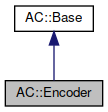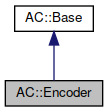#include <arith_code.hh>
Inheritance diagram for AC::Encoder:

Collaboration diagram for AC::Encoder:

Public Member Functions | |
| Encoder (output_callback_t output_callback_=NULL) | |
| initialize, with a callback function that will output bits ; if output_callback_ is NULL then the code should 'poll' the encoder by calling output_bit() More... | |
| void | input_symbol (int symb, const F_t *cum_freq=NULL) |
| insert a symbol; if output_callback() was provided, send it all available bits More... | |
| void | flush () |
 Public Member Functions inherited from AC::Base Public Member Functions inherited from AC::Base | |
| unsigned int | number_input_bits () |
| number of bits inserted in the state More... | |
| unsigned int | number_input_symbols () |
| number of symbols inserted in the state More... | |
| unsigned int | number_output_bits () |
| number of bits extracted from the state More... | |
| unsigned int | number_output_symbols () |
| number of symbols extracted from the state More... | |
| void | print_state () |
| print the internal state More... | |
| interval_t | S_interval () |
| return the S_interval More... | |
| interval_t | B_interval () |
| return the B_interval More... | |
| int | output_bit () |
| outputs one bit from the state, if available, else -1 More... | |
| void | output_bits (output_callback_t out) |
| outputs multiple bits, returns them using a callback (if not null; else they are lost) More... | |
| void | frequencies2cumulative_frequencies () |
| if the output callback is used in decoding, then the "cumulative_frequencies" and "max_symbol" must be used; "cumulative_frequencies" may be updated from "frequencies" using this call, that wraps freq2cum_freq() More... | |
Data Fields | |
| output_callback_t | output_callback |
| callback when the encoder encodes a symbo More... | |
 Data Fields inherited from AC::Base Data Fields inherited from AC::Base | |
| const char * | prefix |
| name of the class, for printing More... | |
| FILE * | verbose_stream = stdout |
| F_t * | cumulative_frequencies = NULL |
| if the output callback is used in decoding, then the "cumulative_frequencies" and "max_symbol" must be updated after each symbol is decoded, with the correct frequencies for the next symbol More... | |
| I_t | max_symbol = -1 |
| if the output callback is used in decoding, then the "cumulative_frequencies" and "max_symbol" must be updated after each symbol is decoded, with the correct frequencies for the next symbol More... | |
| F_t * | frequencies = NULL |
| if the output callback is used in decoding, then the "cumulative_frequencies" and "max_symbol" must be used; these may be derived from a table of frequencies, that may be stored here More... | |
| void * | callback_data = NULL |
Additional Inherited Members | |
 Protected Member Functions inherited from AC::Base Protected Member Functions inherited from AC::Base | |
| void | doubleit () |
| void | doublehi () |
| void | doublelow () |
| void | doublecen () |
| I_t | separ_low_high (int symb, const F_t *cum_freq) |
| divides Slow - Shigh in subintervals : returns the beginning of each interval; note that intervals are in reverse order wrt symbols, that is, symb=0 gives the rightmost subinterval, symb=max_symbols-1 is the leftmost More... | |
| int | resize_pull_one_bit () |
| returns 0 , 1 or -1 if no bit can be pulled at this moment ; resize S-interval and B-interval accordingly More... | |
| I_t | interval_right (int symb, const F_t *cum_freq) |
| right extreme of a S-sub-interval ; note that symbols start from 0 here More... | |
| I_t | interval_left (int symb, const F_t *cum_freq) |
| left extreme of a S-sub-interval More... | |
| void | push_symbol (int symb, const F_t *cum_freq) |
| put symbol in S-interval by splitting it and choosing a subinterval, proportional to the frequencies More... | |
| void | push_bit (int bit) |
| put bit in B-interval More... | |
| Base () | |
 Protected Attributes inherited from AC::Base Protected Attributes inherited from AC::Base | |
| unsigned int | bitsToFollow |
| int | virtual_bit |
| const I_t | One = 1 |
| const I_t | Top = (One << AC_representation_bitsize) |
| representation of 1 More... | |
| const I_t | Qtr = (One << (AC_representation_bitsize-2)) |
| representation of 1/4 More... | |
| const I_t | QtrMinus = (One << (AC_representation_bitsize-2)) - One |
| representation of point preceding 1/4 More... | |
| const I_t | Half = (Qtr*2) |
| Representation of 3/4. More... | |
| const I_t | ThreeQtr = (Qtr*3) |
| representation of 3/4 More... | |
| F_t const | cum_freq_uniform8 [9] = { 8 , 7 , 6 , 5, 4 , 3 , 2 , 1 , 0 } |
| cumulative tables of 8 equidistributed symbols More... | |
| F_t const * | cum_freq_flush = cum_freq_uniform8 |
| special cumulative table used for flushing More... | |
| I_t | Slow |
| S-interval left extreme. More... | |
| I_t | Shigh |
| S-interval right extreme (included in the interval) More... | |
| long_I_t | Srange |
| S-interval width. More... | |
| I_t | Blow |
| B-interval left extreme. More... | |
| I_t | Bhigh |
| B-interval right extreme. More... | |
| unsigned int | significant_bits |
| significant bits (used in the decoder) More... | |
| unsigned int | n_in_bits |
| number of bits inserted in the state More... | |
| unsigned int | n_in_symbs |
| number of symbols inserted in the state More... | |
| unsigned int | n_zooms |
| number of zooms More... | |
| unsigned int | n_out_bits |
| number of bits extracted from the state More... | |
| unsigned int | n_out_symbs |
| number of symbols extracted from the state More... | |
 Static Protected Attributes inherited from AC::Base Static Protected Attributes inherited from AC::Base | |
| static const int | n_symbols_flush = 8 |
| how many symbols in the special cumulative table used for flushing More... | |
Constructor & Destructor Documentation
◆ Encoder()
| AC::Encoder::Encoder | ( | output_callback_t | output_callback_ = NULL | ) |
initialize, with a callback function that will output bits ; if output_callback_ is NULL then the code should 'poll' the encoder by calling output_bit()
- Parameters
-
output_callback_ callback that will receive the encoded bits
Member Function Documentation
◆ flush()
| void AC::Encoder::flush | ( | ) |
flush the encoder (if you are not using callbacks, be sure to pull all bits out of the encoder before and after flushing, or underflow may occour). The method for flushing is described in doc/on_deflushing.pdf
◆ input_symbol()
| void AC::Encoder::input_symbol | ( | int | symb, |
| const F_t * | cum_freq = NULL |
||
| ) |
insert a symbol; if output_callback() was provided, send it all available bits
- Parameters
-
symb symbol to add to the state! cum_freq cumulative frequencies (if not provided, use the internally stored ones
Field Documentation
◆ output_callback
| output_callback_t AC::Encoder::output_callback |
callback when the encoder encodes a symbo
The documentation for this class was generated from the following files:
 1.8.13
1.8.13